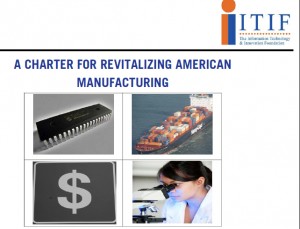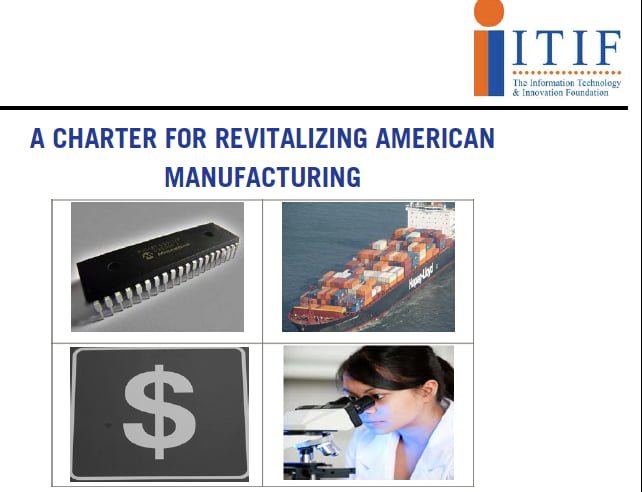by Richard McCormack
Manufacturing News
http://www.manufacturingnews.com/
March 16, 2012
 The United States has no strategy for revitalizing U.S. manufacturing, but representatives from 18 organizations have put forth a set of proposals that could be the foundation of such a policy.
The United States has no strategy for revitalizing U.S. manufacturing, but representatives from 18 organizations have put forth a set of proposals that could be the foundation of such a policy.
Organized by the Information Technology and Innovation Foundation (ITIF), the “Charter for Revitalizing American Manufacturing” came about at the insistence of ITIF President Rob Atkinson, who was intent on finding common issues “that elected officials can jump on without any fear of alienating any important constituencies,” says Atkinson.
The people signing the charter from business, labor, academia, think tanks and non-profits generally don’t work together, but have a common goal of improving U.S. manufacturing. “You should have seen these meetings,” says Atkinson. “We had heated arguments about right-to-work, card check, and repatriation [of overseas profits] versus ending deferral — totally divisive issues.”
But the intention was to create “a big tent” on areas of agreement. The group endorsed policies that promote the importance of manufacturing; encourage balanced rade; support the few government programs aimed at improving the health of small- and medium-sized manufacturers; adopt a corporate tax policy with incentives for investment in productive capacity and innovation; promote workforce training; and create guidelines for public procurement of American-made goods.
For Atkinson, manufacturing is the essential component of an economic revival. But there is still the need to counter the argument made by many economists that the country does not need manufacturing, since it has been declining for 30 years and is the natural progression from an agrarian to a service economy.
The United States, Atkinson points out, has lost more manufacturing capacity over the past decade than any country ever. Yet economists like William Strauss from the Chicago Federal Reserve Bank state that the loss of32 percent of U.S. manufacturing jobs over the past decade is an indication of the U.S. having the most productive— and therefore healthy — economy in the world.
“I can accept some pundits and politicians making these stupid statements,” says Atkinson. “But Strauss is paid by the U.S. government and taxpayers to actually look at the data and not make these ideological, overly general pontifications that are wrong.”
While attending a meeting organized by the Government Accountability Office, Atkinson heard another economist argue that there needs to be federal support or manufacturing because it is important to help working-class whites. This left Atkinson scratching his head. “If that is the argument for a manufacturing policy, then you have lost the battle,” he notes. “Of course, helping white working class workers is important, but it should not be framed as a social policy.
The reason to help manufacturing is because it is the core dependent for health of the entire U.S. economy.”
Why is this argument so hard to win? “Because we have a conservative neoclassical [economic] priesthood that is standing up higher and higher behind the bench proclaiming that you are a sinner” if you believe manufacturing needs special policy attention, Atkinson notes.
This is all “neoclassic nonsense,” he adds. “They are living in a dream world.” Some of the people who fall into this category are the country’s top economic officials, working in senior positions in the White House: former OMB Director Peter Orszag; former chief economic advisor Larry Summers; Secretary of Treasury Timothy Geithner; and Deputy Director of the National Economic Council Jason Furman, among others.
But a lot has changed in two years. There are fewer anti-manufacturing proclamations from the orthodox economists, and the U.S. business community has become more troubled over the loss of domestic manufacturing capacity. “They are much more open to a moreaggressive posture, so that is better than what it was,” says Atkinson. “They don’t like China’s standards manipulation, indigenous innovation policy, joint venture requirements and IP theft,” he says.
The four-page Charter for Revitalizing Manufacturing is located at
http://www.itif.org/files/2011-a-charter-for-revitalizing-manufacturing.pdf.
Among those who signed the Charter are the following:
- Bob Baugh, AFL-CIO Industrial Union Council
- Scott Boos, Alliance for American Manufacturing
- Doug Woods, AMT-Association for Mfg. Technology
- Howard Wial, The Brookings Institution
- Michael Stumo, Coalition for a Prosperous America
- Jack McDougle, Council on Competitiveness
- Clyde Prestowitz, Economic Strategy Institute
- Robert Atkinson, ITIF
- Jeff Finkle, International Economic Dev. Council
- Stephen Gold, Manufacturers Alliance/MAPI
- Mark Rice, Maritime Applied Physics Corporation
- Lenny Mendonca, McKinsey Global Institute
- Fred Wentzel, NACFAM
- Emily DeRocco, NAM’s Manufacturing Institute
- Drew Greenblatt, Regional Manufacturing Alliance
- Harry Moser, Reshoring Initiative
- Mark Tomlinson, Society of Mfg. Engineers
- Jerry Jasinowski, Former President, National Association of Manufacturers
- William Bonvillian, Director of the MIT Washington Office


